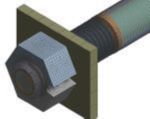Parameter Identification for Signorini problems with friction

Friction plays a decisive role in many mechanical processes. The simulation of such a process depends strongly on the choice of the friction model. Friction models are determined by one or more friction model parameters.
We consider the friction in linear-elastic, unilateral contact problems. Mathematically, the situation is described with the help of Signorini’s problem. Friction is included in the tangential direction on the contact boundary. The setting yields a variational inequality of second kind. We discretize the problem using Finite Element Methods (FEM).
The parameters of the friction model cannot be measured directly and are thus identified numerically. The parameter identification consists of two tasks: defining an objective function that quantifies the difference between measured and calculated displacement data and the minimization of the objective function.
Both the contact constraints and the distinction of the sticking and slipping phases of the friction lead to non-differentiable terms and thus to a non-smooth parameter-to-state operator. To make gradient-based optimization methods applicable, we have to smoothen the problem. This is done by adding a sufficiently smooth penalty term for the contact constraint and by regularizing the friction term. We then obtain a family of regularized parameter identification problems governed by variational equations, which can be solved by standard techniques.
We aim at developing and analyzing an adaptive algorithm that balances the influence of the regularizations. To that end, the dual weighted residual method (DWR) will be applied to derive a goal-oriented error estimator that includes estimators for the discretization error, the quadrature error and the numerical error as well as the penalization error and the friction regularization error.
 Friction plays a decisive role in many mechanical processes. The simulation of such a process depends strongly on the choice of the friction model. Friction models are determined by one or more friction model parameters.
We consider the friction in linear-elastic, unilateral contact problems. Mathematically, the situation is described with the help of Signorini’s problem. Friction is included in the tangential direction on the contact boundary. The setting yields a variational inequality of second kind. We discretize the problem using Finite Element Methods (FEM).
The parameters of the friction model cannot be measured directly and are thus identified numerically. The parameter identification consists of two tasks: defining an objective function that quantifies the difference between measured and calculated displacement data and the minimization of the objective function.
Both the contact constraints and the distinction of the sticking and slipping phases of the friction lead to non-differentiable terms and thus to a non-smooth parameter-to-state operator. To make gradient-based optimization methods applicable, we have to smoothen the problem. This is done by adding a sufficiently smooth penalty term for the contact constraint and by regularizing the friction term. We then obtain a family of regularized parameter identification problems governed by variational equations, which can be solved by standard techniques.
We aim at developing and analyzing an adaptive algorithm that balances the influence of the regularizations. To that end, the dual weighted residual method (DWR) will be applied to derive a goal-oriented error estimator that includes estimators for the discretization error, the quadrature error and the numerical error as well as the penalization error and the friction regularization error.
Friction plays a decisive role in many mechanical processes. The simulation of such a process depends strongly on the choice of the friction model. Friction models are determined by one or more friction model parameters.
We consider the friction in linear-elastic, unilateral contact problems. Mathematically, the situation is described with the help of Signorini’s problem. Friction is included in the tangential direction on the contact boundary. The setting yields a variational inequality of second kind. We discretize the problem using Finite Element Methods (FEM).
The parameters of the friction model cannot be measured directly and are thus identified numerically. The parameter identification consists of two tasks: defining an objective function that quantifies the difference between measured and calculated displacement data and the minimization of the objective function.
Both the contact constraints and the distinction of the sticking and slipping phases of the friction lead to non-differentiable terms and thus to a non-smooth parameter-to-state operator. To make gradient-based optimization methods applicable, we have to smoothen the problem. This is done by adding a sufficiently smooth penalty term for the contact constraint and by regularizing the friction term. We then obtain a family of regularized parameter identification problems governed by variational equations, which can be solved by standard techniques.
We aim at developing and analyzing an adaptive algorithm that balances the influence of the regularizations. To that end, the dual weighted residual method (DWR) will be applied to derive a goal-oriented error estimator that includes estimators for the discretization error, the quadrature error and the numerical error as well as the penalization error and the friction regularization error.

